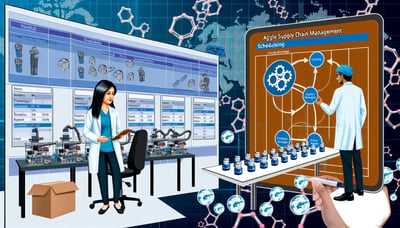Agile Supply Chain Management Transformation
With constantly evolving market demands, regulatory requirements, and supply chain disruptions, the ability to adapt quickly and efficiently is critical for success. For supply chain managers in pharmaceutical manufacturing facilities, this means embracing agile supply chain management practices and leveraging advanced scheduling technologies to optimize operations.
In this blog, we'll explore the concept of agile supply chain management transformation, with a focus on scheduling, and how integration between PlanetTogether and leading ERP, SCM, and MES systems can drive significant improvements in efficiency and responsiveness.

Agile Supply Chain Management
Agile supply chain management is a holistic approach to managing the flow of materials, information, and resources across the supply chain with the goal of quickly responding to changes in demand, supply, or market conditions. Unlike traditional supply chain management methods that are rigid and linear, agile supply chain management emphasizes flexibility, collaboration, and continuous improvement. It enables organizations to detect changes early, make informed decisions quickly, and adapt their processes accordingly.
Key principles of agile supply chain management include:
Flexibility: The ability to quickly adjust production schedules, inventory levels, and distribution channels in response to changing market dynamics.
Collaboration: Close collaboration with suppliers, distributors, and other stakeholders to share information, resources, and risks.
Visibility: Real-time visibility into the entire supply chain, from raw material sourcing to end-customer delivery, to identify bottlenecks, inefficiencies, and opportunities for improvement.
Continuous Improvement: A commitment to continuous learning and adaptation through feedback loops, data analysis, and process optimization.

The Role of Scheduling in Agile Supply Chain Management
Scheduling plays a crucial role in agile supply chain management by ensuring that production activities are aligned with demand, capacity, and resource availability. Effective scheduling enables organizations to optimize production processes, minimize lead times, and respond quickly to changes in customer requirements or market conditions.
However, traditional scheduling methods often fall short in today's dynamic and complex supply chain environments, where factors such as machine downtime, material shortages, and unforeseen disruptions can impact production schedules.
This is where advanced scheduling solutions like PlanetTogether come into play. PlanetTogether is a powerful production planning and scheduling software that empowers organizations to create optimized production schedules based on real-time data, constraints, and objectives.
By leveraging advanced algorithms and simulation capabilities, PlanetTogether enables supply chain managers to:
- Generate detailed production schedules that balance demand, capacity, and resource constraints.
- Identify potential bottlenecks, conflicts, and inefficiencies in production processes.
- Conduct scenario analysis and "what-if" simulations to evaluate the impact of changes in demand, capacity, or resources.
- Collaborate with cross-functional teams to develop and execute agile production plans.
- Monitor and track production performance in real-time to ensure schedule adherence and quality standards.

Integration with ERP, SCM, and MES Systems
To fully harness the power of advanced scheduling solutions like PlanetTogether, integration with other enterprise systems such as ERP (Enterprise Resource Planning), SCM (Supply Chain Management), and MES (Manufacturing Execution System) is essential. Integration enables seamless data exchange, process orchestration, and decision-making across the entire supply chain ecosystem, from planning and procurement to production and distribution.
Among the leading ERP, SCM, and MES systems, integration with platforms such as SAP, Oracle, Microsoft Dynamics, Kinaxis, and Aveva can provide supply chain managers with a comprehensive and unified view of their operations. By synchronizing data and workflows between scheduling, inventory management, procurement, and production execution systems, integration enables:
- Real-time visibility into inventory levels, order statuses, and production progress.
- Automated data capture and synchronization to reduce manual errors and delays.
- Streamlined collaboration and communication between different departments and stakeholders.
- Improved decision-making through access to accurate and up-to-date information.
- Enhanced agility and responsiveness to changes in demand, supply, or market conditions.
Agile supply chain management transformation is essential for pharmaceutical manufacturing facilities to thrive in today's dynamic and competitive market environment. By embracing agile principles and leveraging advanced scheduling technologies like PlanetTogether, supply chain managers can optimize production processes, improve responsiveness, and drive operational excellence.
Integration with leading ERP, SCM, and MES systems further enhances agility and efficiency by providing real-time visibility, automated data exchange, and seamless collaboration across the supply chain ecosystem. As pharmaceutical manufacturers continue to face evolving challenges and opportunities, investing in agile supply chain management and scheduling capabilities will be critical for success in the future.
Are you ready to take your manufacturing operations to the next level? Contact us today to learn more about how PlanetTogether and integrated scheduling solutions can help you achieve your sustainability goals and drive success in the pharmaceutical industry.